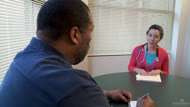Monitoring
Making a Plan: The A1C Test
Having diabetes means that there's a problem in your body that causes sugar to stay in your blood.
This is called high blood sugar.
Over time, high blood sugar can cause problems in many parts of the body.
An A1c test measures the percentage of hemoglobin molecules that have sugar attached to them.
The A1c test also gives you an average estimate of your daily blood sugar.
This result uses the same units as a glucose meter.
So if your A1c result is 7%, that means that 7% of your hemoglobin molecules have sugar attached to them.
And your estimated average blood sugar level is 154.
It's different than other tests, because it shows your average blood sugar level over the past 2 to 3 months.
And the results also show how well your treatment plan is working.
Your goal is to keep your A1c level within a safe range.
You and your doctor or diabetes educator will work together to set your target level within that range.
If your results are too high, your doctor will help you determine your next steps.
You may need a change in your medicine.
It can help to come up with a plan for ways you can lower your A1c.
So think about what part of diabetes care you want to focus on first.
Is it taking your medicine?
How about eating well?
Would you like to be more active?
Or is it something else?
Okay, let's say you and your doctor decide to focus on taking your medicine.
There are a lot of reasons people don't take their medicines.
Sometimes they forget.
Sometimes they can't keep track.
If this sounds like you, maybe you could try a pill organizer.
Or set an alarm on your phone.
Or put reminder notes on the bathroom mirror.
You may have your own ideas that can help you take your medicine.
Find what works for you.
Each little change you make can help build your confidence and your ability to make a bigger change.
Another key to making positive changes is to find things that you like to do.
Sometimes it helps to use a habit you already have to make a new one.
For example, each night after eating dinner, you could take a walk.
Whatever your goal is, making a plan may help you get one step closer to your target A1c and on track for feeling better and living longer.
Credits
- Current as of
- 07 07, 2025
- Author
- Medical Review
-
